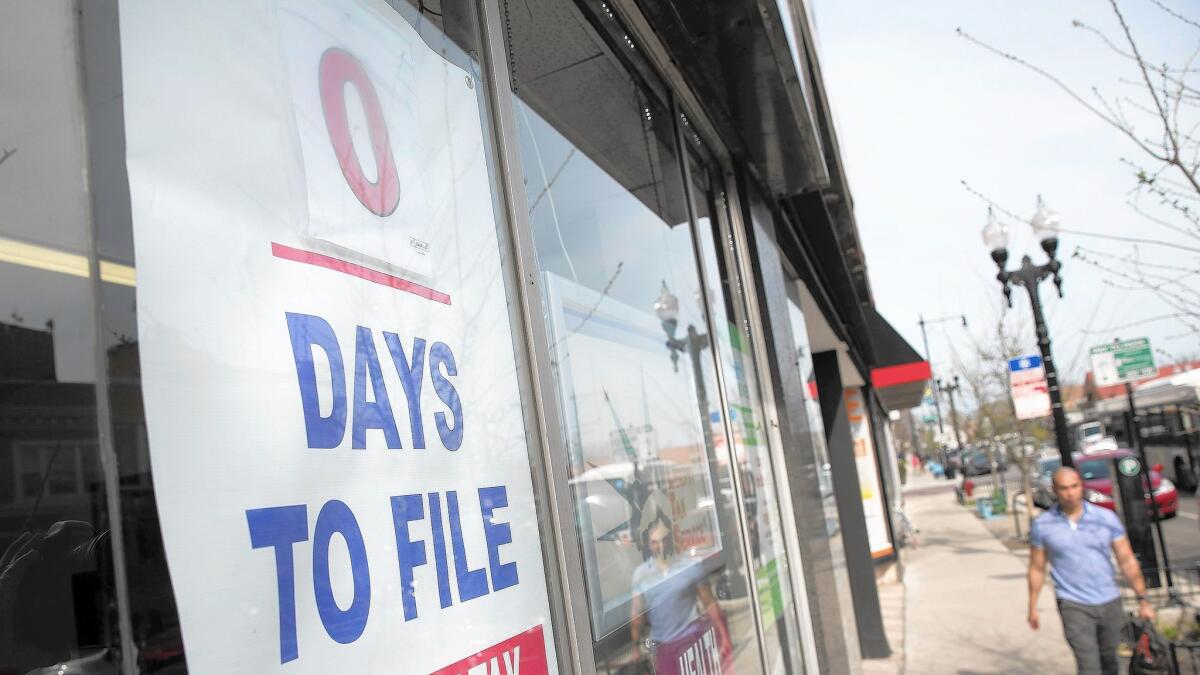The wild schemes people will use to commit tax fraud

Three things are certain in life. Death and taxes are two of them.
The third is tax fraud.
With tax day come and gone, federal investigators now face another year of chasing some of America’s most colorful paper bandits through mountains of tax returns, bank statements and corporate documents.
Have you heard the one about the Alaska plastic surgeon whose wife filed for divorce? Michael D. Brandner, 67, didn’t want her to get her share of the couple’s money, investigators said.
So, prosecutors say, Brandner drove to Central America in 2007 in a 1971 Mercedes to stash $4.6 million in a Panama shell corporation and $350,000 in bank accounts in Costa Rica.
Brandner also stuffed a thousand ounces of gold worth almost $800,000 into a Costa Rican safe deposit box — leaving his ex-wife to apply for welfare and food stamps, according to court records.
Brandner was sentenced to four years in prison this month for wire fraud and tax evasion. One of the terms of his eventual probation is that he keep only a single checking account in his name — and that he files accurate tax returns when he gets out.
NEWSLETTER: Get the day’s top headlines from Times Editor Davan Maharaj >>
The recent leak of the so-called Panama Papers brought global scrutiny to the ways in which the wealthy have hidden their money from the public and from their own nations’ tax collectors.
But tax fraud and evasion are also problems in the U.S., with the Justice Department pursuing crooks big and small who have collectively made off with billions of dollars of the public’s money through a discombobulating array of schemes.
“The department’s cases this past year have addressed a wide variety of tax crimes including: tax evasion; preparing and filing false and fraudulent tax returns; failing to file tax returns; evasion of payment and obstruction; failing to collect, account for and deposit employment tax; conspiring to defraud the IRS; and, illegally concealing offshore accounts,” Acting Assistant Atty. Gen. Caroline D. Ciraolo of the Justice Department’s tax division said in a statement.
“I’m extremely proud of the men and women who prosecute these cases and in doing so, send a clear message to honest taxpayers that those who engage in this criminal conduct will be held accountable,” Ciraolo said.
The schemes are varied enough that each year the Internal Revenue Service puts together a “dirty dozen” list of tax scams. Some are banal, like padding deductions or falsely claiming tax credits.
Other schemes are more extravagant, such as crooks who pretend to be IRS agents. They’ll call and threaten to imprison or deport their victims for allegedly not paying their taxes, and then run off with the money.
IRS impersonators have scammed about 5,000 people out of $26.5 million since October 2013, the agency said.
Then there’s stolen identity refund fraud, a big one. Thieves who have stolen Social Security numbers from hospitals, nursing homes and from lists of the dead have filed millions of fraudulent tax returns, making off with almost $6 billion in refunds in 2013 alone.
The criminals aren’t always identity thieves. Sometimes they’re the very people that the system needs to function, like lawyers and tax preparers.
One IRS agent posed as a New Jersey inmate to catch two tax preparers who filed bogus returns for prisoners so they could cash the refunds. Kamal J. James of Seaford, Del., and Crystal G. Hawkins of Laurel, Del., were convicted and sentenced last week to eight years and four years in prison, respectively. They also were ordered to pay $570,897 in restitution.
This month, U.S. marshals captured a former lawyer, Palle Bognaes, who had been sentenced to more than six years in prison in 2002 for his part in a scheme to help clients avoid paying taxes in Nevada. Bognaes never showed up to report to prison.
After 14 years on the run, investigators tracked him down in Phoenix. He claimed his name was Sam Smith. One tiny problem: Smith and Bognaes had the same fingerprints. On April 8, a judge ordered Bognaes to finally start serving his prison term.
See more of our top stories on Facebook >>
The IRS also has a dislike for tax protesters who use “frivolous” arguments to avoid paying taxes — such as claiming that they’re citizens of their state rather than of the United States and thus don’t have to pay federal taxes.
This argument does not tend to play well in federal court.
And, of course, tax fraud can be as simple as refusing to file and pay taxes.
Alaska attorney Paul D. Stockler — a former prosecutor who was also licensed to practice law in California — has had trouble filing tax returns on time since 2000. In 2006, 2008 and 2009, Stockler didn’t pay income taxes at all.
In a court filing, Stockler’s attorney blamed procrastination, which “increased with each deadline he missed.... Mr. Stockler fell victim to self-sabotage.”
The government was also a victim of Stockler’s self-sabotage — to the tune of $886,058 in unpaid taxes — and was less charmed by the defense’s posture of haplessness.
“During this same period the defendant did find the money to spend on other living expenses, including gambling, cars and property,” prosecutors wrote in a sentencing memo.
Stockler was sentenced to one year and two months in prison. It’s usually hard to beat the taxman at his own game.
MORE BUSINESS NEWS
Why sporting goods retailers are fumbling
With Tesla 3, German automakers are now seeing Tesla as a threat
Trouble getting rental cars adds to problems for those waiting for Takata air bag repairs
More to Read
Start your day right
Sign up for Essential California for news, features and recommendations from the L.A. Times and beyond in your inbox six days a week.
You may occasionally receive promotional content from the Los Angeles Times.







